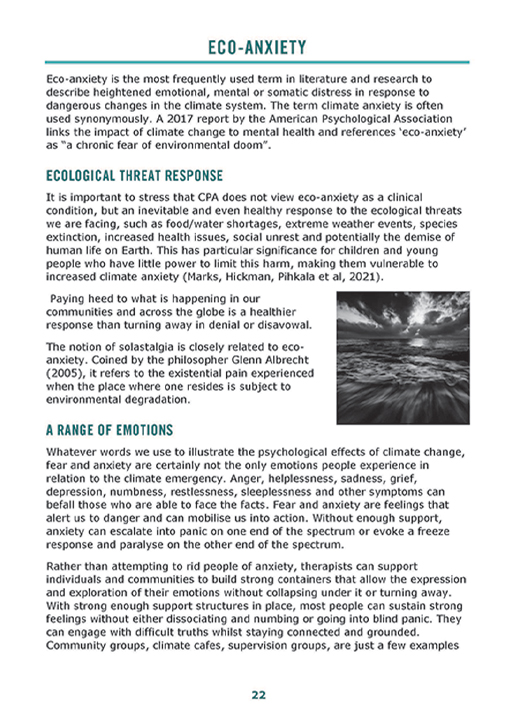4 Eco-anxiety
You can probably see traces of what is called ‘eco-anxiety’ in Shelot Masithi’s story. It is increasingly common and the term has now even entered the popular media, but what does it mean? There have been various definitions given:
- ‘a chronic fear of environmental doom’ (Clayton et al. for the American Psychological Association press conference, 2017, p. 68)
- ‘dread associated with negative environmental information more generally’ (Clayton, 2020, p. 2)
- ‘heightened psychological (mental, emotional, somatic) distress in response to the climate emergency’ (Bednarek, 2019).
The Climate Psychology Alliance Handbook [Tip: hold Ctrl and click a link to open it in a new tab. (Hide tip)] has definitions and discussions of key terms. Figure 1 shows a screenshot of the page on eco-anxiety.
A piece of research across many continents that asked for young people’s responses about climate change found how widespread eco-anxiety is and how it is closely linked with people’s perceptions that people in power are not doing enough and are not trustworthy on the issue of climate and ecological threats. It is referenced above, on the page of the CPA handbook defining eco-anxiety. The same team, Elizabeth Marks, Caroline Hickman, Panu Pikhala and Elouise Mayall, then gave evidence to the UK government, drawing on their research and professional expertise. In their summary they said:
Concern about climate change and environmental issues is highly prevalent across the UK (and worldwide) and increasingly associated with a range of painful eco-emotions, functional impairment, disturbing thoughts and feeling betrayed by governments who are failing to act. (…) Although painful, these emotions are realistic responses to the realities of today’s world. Depending on how we work with emotions, they have the potential to be either significant catalysts for change, or barriers leading to disengagement, avoidance, or paralysis.
You can find the full statement here: Submission to The House of Lords Environment and Climate Change. Committee inquiry into behaviour change in the context of climate change and the environment: A psycho-social perspective

